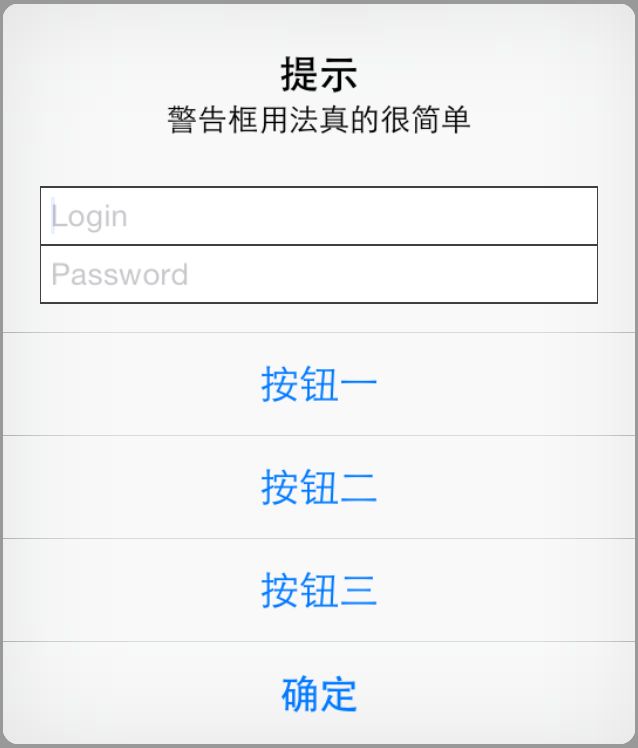UIAlertController VS UIAlertView and UIActionSheet
UIAlertView和UIActionSheet都是iOS系统自带的弹出式对话框。当UIAlertView或UIActionSheet显示出来时,用户无法与应用界面中的其他控件交互。UIAlertView与UIActionSheet的最大区别在于:UIAlertView表现为显示在屏幕中央的弹出警告框;UIActionSheet则表现为显示在底部的按钮列表;
一、UIAlertView
1、UIAlertView的基本用法
- 创建UIAlertView,创建该对象时刻指定该警告框的标题、消息内容,以及该警告框包含多少个按钮等信息。如果程序需要监听用户点击了警告框的哪个按钮,还需要在创建UIAlertView时设置UIAlertViewDelegate委托对象;
- 调用UIAlertView显示出来即可;
- 如果需要监听用户点击了警告框中的哪个按钮,为委托对象是吸纳UIAlertViewDelegate协议中的方法。
2、UIAlertView的基本属性
(1)、- (instancetype)initWithTitle:(NSString )title message:(NSString )message delegate:(id //)delegate cancelButtonTitle:(NSString )cancelButtonTitle otherButtonTitles:(NSString )otherButtonTitles, … NS_REQUIRES_NIL_TERMINATION NS_EXTENSION_UNAVAILABLE_IOS(“Use UIAlertController instead.”);
初始化 参数: ①、title:标题 ②、delegate:遵循UIAlertViewDelegate的代理 ③、message:信息 ④、cancelButtonTitle:按钮标题 ⑤、otherButtonTitles:其他按钮标题(2)、@property(nonatomic,assign) id // delegate;
设置代理(遵循UIAlertViewDelegate)(3)、@property(nonatomic,copy) NSString *title;
设置标题(4)、@property(nonatomic,copy) NSString *message;
设置信息(5)、- (NSInteger)addButtonWithTitle:(NSString *)title;
给指定标题添加按钮(6)、- (NSString *)buttonTitleAtIndex:(NSInteger)buttonIndex;
获取指定索引的按钮的标题(7)、@property(nonatomic,readonly) NSInteger numberOfButtons;
获取按钮总数(8)、@property(nonatomic) NSInteger cancelButtonIndex;
获取取消按钮的索引(9)、@property(nonatomic,readonly) NSInteger firstOtherButtonIndex;
获取第一个其他按钮的索引,只读属性(10)、@property(nonatomic,readonly,getter=isVisible) BOOL visible;
获取AlertView是否可见,只读属性(11)、- (void)show;
展示(12)、- (void)dismissWithClickedButtonIndex:(NSInteger)buttonIndex animated:(BOOL)animated;
隐藏,若点击不需调用;
3、UIAlertView的输入框
- (1)、 @property(nonatomic,assign) UIAlertViewStyle alertViewStyle NS_AVAILABLE_IOS(5_0);
该属性用于设置该UIAlertView的风格,它支持如下枚举值:(UIAlertViewStyle)
UIAlertViewStyleDefault:默认的警告框风格;
UIAlertViewStyleSecureTextInput:警告框中包含一个密码的输入框;
UIAlertViewStylePlainTextInput:警告框中包含一个普通的输入框;
UIAlertViewStyleLoginAndPasswordInput:警告框中包含用户名、密码两个输入框。
例如:
MyAlertView.alertViewStyle = UIAlertViewStyleDefault;通过该UIAlertView的actionSheerStyle属性,即可控制警告框使用不同的风格,包括带普通文本框、带密码框、带用户名和密码输入框的警告框。
- (2)、- (UITextField *)textFieldAtIndex:(NSInteger)textFieldIndex;
如果UIAlertView控件中带有输入框,程序可通过上述方法来访问该警告框中的输入框,获取textFieldIndex索引对应的文本框。第一个文本框的索引为0;通过上述的方式获取UIAlertView中包含的UITextView控件之后,接下来就可以对该UITextField进行任何操作,包括定制其外观(改变它的字体和颜色、关联的键盘灯等)。也可以获取用户在UITextView中输入的字符。
例如:
UITextField* textField = [MyAlertView textFieldAtIndex:0];- (3)、当想改变UIAlertView中的message中的UILabel的属性时,可在UIAlertView将要出现的时候遍历其子视图,然后设置属性,例如:
- (void)willPresentAlertView:(UIAlertView *)alertView{
for (UIView* view in alertView.subviews) {
if ([view isKindOfClass:[UILabel class]]) {
UILabel* label = (UILabel *)view;
label.textAlignment = NSTextAlignmentLeft;
}
}
}3、UIAlertViewDelegate
#pragma mark -UIAlertViewDelegate委托方法
(1)、- (void)willPresentAlertView:(UIAlertView *)alertView;
//当警告框将要显示出来时将会激发该方法;(2)、 - (BOOL)alertViewShouldEnableFirstOtherButton:(UIAlertView *)alertView;
//当该警告框中第一个非Cancel按钮被启用时激发该方法;(3)、 - (void)didPresentAlertView:(UIAlertView *)alertView;
//当警告框完全显示出来后将会激发该方法;(4)、 - (void)alertView:(UIAlertView *)alertView willDismissWithButtonIndex:(NSInteger)buttonIndex;
//当用户通过单击某个按钮将要隐藏该警告框时激发该方法;(5)、 - (void)alertView:(UIAlertView *)alertView clickedButtonAtIndex:(NSInteger)buttonIndex;
//当用户单击该警告框中某个按钮时激发该方法,其中buttonIndex参数代表用户单击的按钮的索引,该索引从0开始;(6)、 - (void)alertView:(UIAlertView *)alertView didDismissWithButtonIndex:(NSInteger)buttonIndex;
//点那个用户用过单击某个按钮完全隐藏该警告框时激发该方法;(7)、 - (void)alertViewCancel:(UIAlertView *)alertView;
//当该对话框被取消时(如用户点击了Home键)激发该方法;
二、UIActionSheet
1、UIActionSheet的基本用法
UIActionSheet变现为显示底部按钮列表,用户通过单击某个按钮来表明自己的态度,默认情况下,UIActionSheet只支持一个标题和多个按钮,UIActionSheet会有两个固定的按钮和多个其他按钮,两个固定按钮如下:
- (1)、灰色背景的取消按钮,该按钮用户取消显示该UIActionSheet。
- (2)、红色背景的销毁按钮,当用户视图删除某个文件或某条记录时,可让用户通过该按钮来确认删除。
2、UIActionSheet的基本属性
(1)、 - (instancetype)initWithTitle:(NSString )title delegate:(id)delegate cancelButtonTitle:(NSString )cancelButtonTitle destructiveButtonTitle:(NSString )destructiveButtonTitle otherButtonTitles:(NSString )otherButtonTitles, … NS_REQUIRES_NIL_TERMINATION NS_EXTENSION_UNAVAILABLE_IOS(“Use UIAlertController instead.”);
初始化 参数: ①、title:标题; ②、delegate:遵循UIActionSheetDelegate的代理; ③、cancelButtonTitle:取消按钮标题; ④、destructiveButtonTitle:默认红色按钮的标题 ⑤、otherButtonTitles:其他按钮的标题(2)、 @property(nonatomic,assign) id delegate;
设置遵循UIActionSheetDelegate的delegate;(3)、 @property(nonatomic,copy) NSString *title;
设置标题;- (4)、 @property(nonatomic) UIActionSheetStyle actionSheetStyle;
设置控件的风格,该属性支持如下枚举值:
UIActionSheetStyleDefault:默认风格,灰色背景上显示白色文字;
UIActionSheetStyleBlackTranslucent:在透明的黑色背景上显示白色文字;
UIActionSheetStyleBlackOpaque:在纯黑的背景上显示白色文字;
(5)、 - (NSInteger)addButtonWithTitle:(NSString *)title;
通过给指定标题添加按钮;(6)、 - (NSString *)buttonTitleAtIndex:(NSInteger)buttonIndex;
获取指定索引的标题;(7)、 @property(nonatomic,readonly) NSInteger numberOfButtons;
获取按钮个数;(8)、 @property(nonatomic) NSInteger cancelButtonIndex;
获取取消按钮的索引;(9)、 @property(nonatomic) NSInteger destructiveButtonIndex;
获取红色按钮的索引;(10)、 @property(nonatomic,readonly) NSInteger firstOtherButtonIndex;
获取第一个其他按钮的索引,该属性为只读按钮;(11)、 - (void)showFromToolbar:(UIToolbar *)view;
设置UIActionSheet显示再一个UIToolbar控件上;(12)、 - (void)showFromTabBar:(UITabBar *)view;
设置UIActionSheet显示再一个UITabBar控件上;(13)、 - (void)showInView:(UIView *)view;
设置UIActionSheet显示再一个UIView控件上;(14)、 - (void)dismissWithClickedButtonIndex:(NSInteger)buttonIndex animated:(BOOL)animated;
不考虑指定索引的按钮的动作,可以设置是否有动画;
3、UIActionSheetDelegate
#pragma mark -UIActionSheetDelegate委托方法
- (1)、- (void)actionSheet:(UIActionSheet *)actionSheet clickedButtonAtIndex:(NSInteger)buttonIndex;//当用户单击该警告框中某个按钮时激发该方法,其中buttonIndex参数代表用户单击的按钮的索引,该索引从0开始;
- (2)、 - (void)actionSheetCancel:(UIActionSheet *)actionSheet;//当该对话框被取消时(如用户点击了Home键)激发该方法;
- (3)、 - (void)willPresentActionSheet:(UIActionSheet *)actionSheet;//当警告框将要显示出来时将会激发该方法;
- (4)、- (void)didPresentActionSheet:(UIActionSheet *)actionSheet;//当警告框完全显示出来后将会激发该方法;
- (5)、- (void)actionSheet:(UIActionSheet *)actionSheet willDismissWithButtonIndex:(NSInteger)buttonIndex;//当用户单击该警告框中某个按钮时激发该方法,其中buttonIndex参数代表用户单击的按钮的索引,该索引从0开始;
- (6)、- (void)actionSheet:(UIActionSheet *)actionSheet didDismissWithButtonIndex:(NSInteger)buttonIndex;//点那个用户用过单击某个按钮完全隐藏该警告框时激发该方法;
三、UIAlertController
在iOS 8中,UIAlertController在功能上是和UIAlertView以及UIActionSheet相同的,UIAlertController以一种模块化替换的方式来代替这两货的功能和作用。是使用对话框(alert)还是使用上拉菜单(action sheet),就取决于在创建控制器时,您是如何设置首选样式的。
1、 UIAlertAction
(1)、 + (instancetype)actionWithTitle:(NSString *)title style:(UIAlertActionStyle)style handler:(void (^)(UIAlertAction *action))handler;
初始化 参数: ①、title:标题 ②、style:类型(动作样式),包括如下枚举值: typedef NS_ENUM(NSInteger, UIAlertActionStyle) { UIAlertActionStyleDefault = 0, //常规 UIAlertActionStyleCancel, //取消 UIAlertActionStyleDestructive //警示 } NS_ENUM_AVAILABLE_IOS(8_0); ③、handler:点击调用block(2)、 @property (nonatomic, readonly) NSString *title;
设置标题;(3)、 @property (nonatomic, readonly) UIAlertActionStyle style;
设置类型;(4)、 @property (nonatomic, getter=isEnabled) BOOL enabled;
是否可点击;
2、 UIAlertController
(1)、+ (instancetype)alertControllerWithTitle:(NSString )title message:(NSString )message preferredStyle:(UIAlertControllerStyle)preferredStyle;
初始化 参数: ①、title:标题 ②、message:信息 ③、preferredStyle:类型,该值可以是如下枚举值 typedef NS_ENUM(NSInteger, UIAlertControllerStyle) { UIAlertControllerStyleActionSheet = 0, UIAlertControllerStyleAlert } NS_ENUM_AVAILABLE_IOS(8_0);(2)、 - (void)addAction:(UIAlertAction *)action;
添加UIAlertAction控件;(3)、 - (void)addTextFieldWithConfigurationHandler:(void (^)(UITextField *textField))configurationHandler;
添加文本对话框(4)、 @property (nonatomic, readonly) NSArray *actions;
该属性返回所有UIAlertAction控件;(5)、 @property (nonatomic, copy) NSString *title;
设置标题;(6)、@property (nonatomic, copy) NSString *message;
设置信息;(7)、 @property (nonatomic, readonly) UIAlertControllerStyle preferredStyle;
设置类型
3、对话框(alert)
- (IBAction)alertClick:(id)sender {
NSLog(@"点击了警告框");
UIAlertController*al=[UIAlertController alertControllerWithTitle:@"警告框" message:nil preferredStyle:UIAlertControllerStyleAlert];
[al addAction:[UIAlertAction actionWithTitle:@"确定" style:UIAlertActionStyleDefault handler:^(UIAlertAction *action) {
NSLog(@"确定");
}]];
[al addAction:[UIAlertAction actionWithTitle:@"取消" style:UIAlertActionStyleDefault handler:^(UIAlertAction *action) {
NSLog(@"取消");
}]];
[al addTextFieldWithConfigurationHandler:^(UITextField *textField){
textField.placeholder = @"登录";
}];
[al addTextFieldWithConfigurationHandler:^(UITextField *textField) {
textField.placeholder = @"密码";
textField.secureTextEntry = YES;
}];
[self presentViewController:al animated:YES completion:nil];
}4、上拉菜单(action sheet)
- (IBAction)actionClick:(id)sender {
NSLog(@"点击了选择框");
UIAlertController*al=[UIAlertController alertControllerWithTitle:@"选择照片" message:nil preferredStyle:UIAlertControllerStyleActionSheet];
[al addAction:[UIAlertAction actionWithTitle:@"相机" style:UIAlertActionStyleDefault handler:^(UIAlertAction *action) {
NSLog(@"相机");
}]];
[al addAction:[UIAlertAction actionWithTitle:@"取消" style:UIAlertActionStyleCancel handler:^(UIAlertAction *action) {
NSLog(@"取消");
}]];
[self presentViewController:al animated:YES completion:nil];
}注意:每个UIAlertController只允许包含一个UIAlertActionStyleCancel类型的UIAlertAction。

